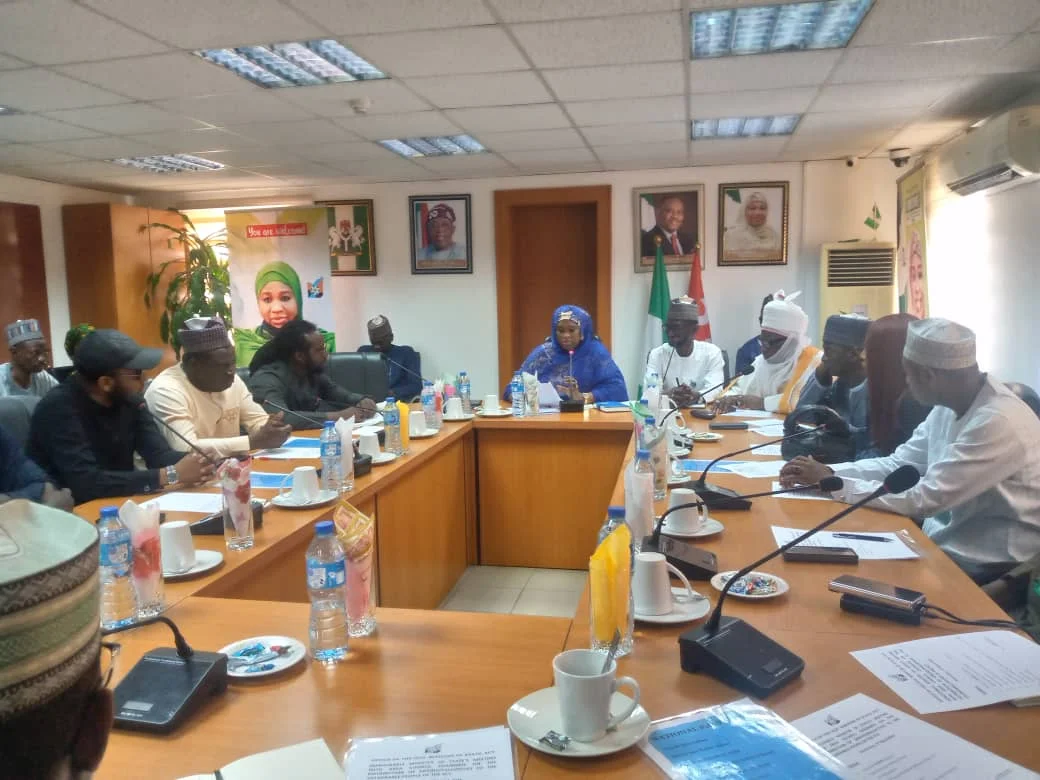Business
NABDA Biodigester: Alternative Energy Source For Nigerians

Over the last decades,
international development organi-sations have been actively engaged in encouraging biogas technologies in the developing world.
The development partners underscored the rising need for the reduction of pollution and re-use of Biodegradable organic Feedback (BoF), particularly in Africa.
According to them, bio-energy constitutes a significant proportion of energy mix of countries in Europe, America and should be replicated in Africa.
This development necessitated the adaptation of technologies that can transform BoF such as food and agro-related waste, sewage sludge and municipal organic waste into valuable products like bioenergy and biofertiliser.
Experts in the field observed that Egypt, AlgeriaA, South Africa and Kenya have made good success in the areas of biogas generation for domestic cooking and bioelectri-city generation.
It was, therefore, not an accident, when in 2015 the Federal Government, as parts of Nigeria’s Economy Recovery and Growth Plan mandated the National Biotechnology Development Agency (NABDA) to design programmes for the nation’s bioenergy advancement.
The focus of NABDA in this regards was clear, to develop prototype digesters and other systems that will utilise the abundant BoF across the country.
Specifically, the agency was given the mandate to ensure that bioenergy, comprising ethanol and biogas constitute five per cent of Nigeria’s energy mix.
In a major breakthrough, NABDA on July 23 unveiled a prototype Digesters and Process Optimisation Test Systems to serve as alternative energy in rural and urban settlements of the country.
The Acting Director-General of the agency, Prof. Alex Akpa who performed the unveiling ceremony in Abuja said the unique product known as prototype digester was developed by the Environmental Biotechnology and Bio-Conservation Department of NABDA.
Akpa noted that the product was built for households, small and medium scale enterprises such as restaurants, small farms, small artisanal clusters and small abattoirs.
“The Biodigester is quite affordable, the smallest size is about N75,000 while the biggest is about N150,000.
“We are ready for the market. We are hopeful that industrialists could partner with us to achieve mass production,’’ he said.
The acting D-G said the prototype bio-digesters have been developed with all sectors in mind comprising three sizes produced and named BEGS 250 litres, BEGS 500litres and BEGS 1000litres.
“The team has developed the capacity to retrofit existing gasoline and diesel generator to use biogas as fuel for electricity generation.
“The technology can transform biodegradable organic feedstock into valuable products such as biogas and bio-fertiliser, he added.
He assured that the agency would continue to provide technical assistance in all aspects of bio-energy develop-ment in the country and ensure the digesters and test systems are produced in quantities that would be affordable.
Mr Ayodele Oluwole explained that biodigester is designed as a closed system, capable of fermenting biodegradable materials placed inside it to produce a renewable energy source.
Oluwole, a biogas technologist, said organic materials such as agricultural waste, manure, municipal waste, plant material, sewage, green waste or food waste are broken down in the biodigester to produce biogas which is mixture of gasses, methane, hydrogen and carbon monoxide.
He said the energy released, through combustion allows biogas to be used as a fuel that could be used for any heating purpose, such as cooking.
Oluwole added that it could also be used in a gas engine to convert the energy in the gas into electricity.
“In advanced usage, Biogas can also be compressed, the same way as natural gas is compressed and used to power motor vehicles.
“In the United Kingdom for example, biogas is estimated to have the potential to replace around 17 per cent of vehicle fuel,’’ he said.
Mrs Gloria Obioh, the Head of the department that championed the innovation allayed the fear of readily available raw materials for the biodigester. Obioh said organic wastes including sewage sludge account for about 50 per cent of municipal solid wastes in Nigeria.
She added that agricultural waste, manure, plant material and green waste are readily available in rural settlements of the country.
“The project has enhanced capacity for job creation across all value chains, digester fabrication, energy generation, waste management and bio-fertiliser production’’.
“Consequently there would be several spin-off industries which would contribute greatly to Gross Domestic Products (GDP) and National Development,’’ she said.
Obioh also noted that, if developed, Anaerobic Digestion Technology (ADT) will contribute up to 20,000 MW of electricity to the national grid.
The Executive Vice Chairman of National Agency for Science and Engineering Infrastructure (NASENI), Prof Mohammed Haruna urged NABDA to perfect the technology and make the products available to end users.
Stakeholders in the sector believe that the breakthrough by NABDA will be whole when the agency, make the products affordable and available as alternative energy source to rural, urban settlements.
Onifade writes for New Agency of Nigeria (NAN).
Olasunkanmi Onifade
Business
NCDMB Tasks Media Practitioners On Effective Reportage

Business
FCTA, Others Chart Path To Organic Agriculture Practices

The Federal Capital Territory Administration (FCTA) and other stakeholders have charted path to improved organic agriculture practices nationwide.
At a 2024 national organic and agroecology business summit held recently in Abuja, stakeholders took turn to speak on the additional areas of promoting the practices.
The Mandate Secretary, FCT Agriculture and Rural Development Secretariat (ARDS), Lawan Geidam, advocated for sustainable practice to develop resilient food systems that will benefit people.
The event, with the theme,”Towards Policies for Upscaling Organic Agroecological Businesses in Nigeria”, is aimed at fostering growth in the organic agriculture sector.
Geidam, who was represented by the Acting Director, Agric Services, in the Secretariat, Mr. Ofili Bennett, emphasised the success of organic and agroecological farming, reling on the active involvement of farmers, businesses and consumers.
He reassured attendees that the FCT Administration, led by the Minister, Nyesom Wike, and Minister of State, Dr. Mariya Mahmoud, remains dedicated to supporting initiatives that enhance the livelihood of residents.
Geidam described the partnership between the Secretariat and the organic and Agroecology initiative for a monthly exhibition and sale of organic products in the FCTA premises as a testament to this commitment.
“The ARDS remains committed to driving policies and initiatives that align with national goals and global standards”, Geidam said.
On her part, the Chairperson of Organic and Agroecology Initiative, Mrs. Janet Igho, urged residents to embrace healthy eating habits to sustain a good lifestyle. She stressed the importance of adopting organic practices, highlighting the benefits of going organic, growing organic and consuming organic products.
Igho expressed her optimism regarding the Agricultural Revival Programmes as articulated in President Bola Ahmed Tinubu’s “Renewed Hope Agenda”, which aims at fostering food and nutrition security.
She also extended her gratitude to ARDS for graciously allocating a space in the FCTA premises for the exhibition and sale of organic products, noting that the platform has been effectively used to advance the promotion of organic agriculture in FCT.
Igho outlined several benefits of organic agriculture which includes improved soil health, increased biodiversity, availability nutritious and healthy food and a reduced carbon footprint.
Stakeholders at the summit, underscored the critical need for enhanced private sector involvement and robust capacity building initiatives for farmers.
They highlighted the importance of implementing supportive policies to foster the growth of the organic agriculture sector.
In the light of the significant challenges facing Nigeria’s agricultural landscape, stakeholders decided that organic agricultural practices present sustainable solutions and a pathway for a more resilient and productive farming systems.
The three-day summit featured exhibitions showcasing organic foods, fruits, vegetables and fertilizers, providing an opportunity for residents to better appreciate the benefits of production and consumption of organic agricultural products.
Business
Dangote Refinery Exports PMS to Cameroon

-
Sports2 days ago
Odiemerenyi Wins OML 58 Tournament
-
Nation2 days ago
Fubara Gets Kudos Over Grassroots Dev
-
Rivers2 days ago
RSG Condemns Acts Of GBV … Calls For Collective Action
-
Opinion2 days ago
Nigeria’s Electricity Sector: Need For Restructuring
-

 News2 days ago
News2 days agoForge Unity For Progress, Fubara Urges Nigerian Youths …Accepts Beacon Of Hope Award
-
Politics2 days ago
Inclusivity: Chief Whip Makes Case For Women
-
Sports2 days ago
Subsea Cycling Club Chairman Solicits For Support
-
Nation2 days ago
Director Tasks ICAD Members On Professionalism

